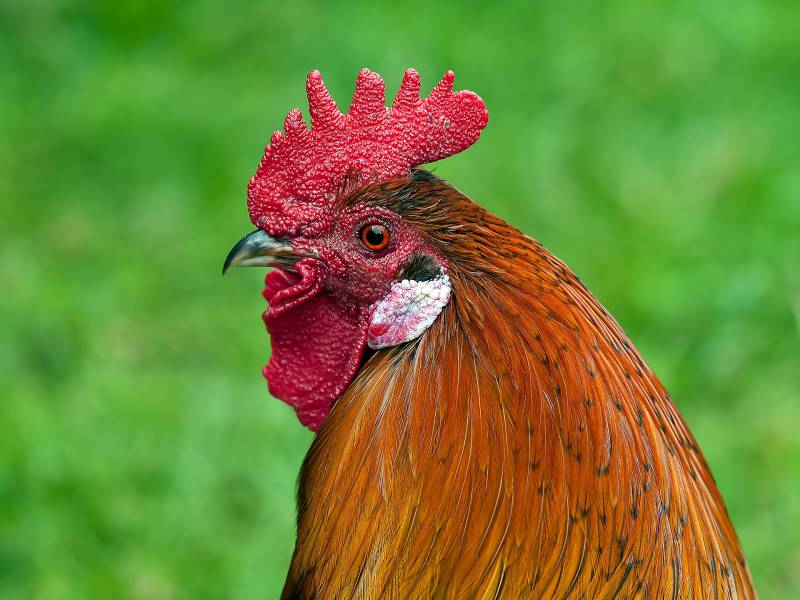Quick Navigation
- Treat The Wheezing Chicken
- 1. Isolate The Infection
- 2. Take Outstanding Care Of The Sick Chickens
- 3. Make Use Of Broad-Spectrum Antibiotics
- 4. You Can Also Do Your Best To Reduce The Rate At Which Your Chicken Gets Re-Infected
- 5. Getting Rid Of The Mold Source
- 6. Usage Of Rodent Control
- 7. Avoid Contact With Infected Chicken
- 8. Use Effective Vaccines
- 9. Provide Supportive Care
- 10. Use Tissue-culture-origin Vaccine
- 11. Divide Your Chicken Flock
- What Are The Best Ways To Keep Your Chickens Safe?

If you have chickens suffering from wheezing, it is essential to handle the condition quickly.
It is rare for chickens to recover without intervention.
You must help your ill chickens as soon as you can before they spread the wheezing illness to other birds in the flock.
Treat The Wheezing Chicken
Respiratory diseases in chickens would require proper medical treatment.
If untreated, they spread to other chickens and eventually kill them.
So to take care of your chickens that are suffering from these infections or wheezing, you should follow these steps below:
1. Isolate The Infection
We all know that chickens are exceptionally social.
Infectious diseases would spread with speed, and before you know it, all your chickens would start wheezing.
When you notice that some birds have started wheezing, make sure you isolate them so the rest of your chickens would be safe.
It would help if you made sure the infected chickens have their feed and drinking water. This will assure that the other flocks will not be infected.
2. Take Outstanding Care Of The Sick Chickens
Your chickens would need to get better with haste, so provide them with enough warmth, nutrition, and hydration.
Your chickens that are wheezing need lots of water so you need particular attention to hydration.
If your chickens suffer from a severe level of infection or wheezing, you might need to make use of a spoon or dropper to give them water.
This type of care is critical till your chicken can adequately recover and drink water without any help.
If the case is quite severe, you could use AviLYTE, which is an electrolyte solution.
3. Make Use Of Broad-Spectrum Antibiotics
Chicken Respiratory Illness can be spreading fast.
Some causes of wheezing include pneumonia, tracheitis, bronchitis, or laryngitis.
I recommend using broad-spectrum antibiotics that are best for chickens.
You could get these antibiotics over the counter. You could also have a conversation with a veterinarian.
It is also okay to treat these diseases by making use of ancient methods or natural techniques, in cases where the infection is not very advanced.
VetRx Poultry Remedy could be used as a natural method to treat your chicken.
4. You Can Also Do Your Best To Reduce The Rate At Which Your Chicken Gets Re-Infected
It would help if you managed the coop of your chickens properly.
After your chickens have suffered from any illness, you need to clean the coop thoroughly so there would not be any chance of your chicken getting infected by the same disease another time.
This is reasonably necessary for the prevention of the spread of this disease.
5. Getting Rid Of The Mold Source
Dust and debris particles can float around the coop and cause a few mild symptoms in your chickens.
You can treat chicken respiratory infections by removing the mold source which could prevent new respiratory infections from coming up.
Thus, proper management of the coop is essential in order to prevent the spread of diseases, such as disinfection and thorough cleaning of the coop, especially after any illness, to reduce the risk of reinfection.
Try your best not to treat your chicken individually.

6. Usage Of Rodent Control
You should use a proper antibiotic to treat your chicken flock when they have a respiratory infection.
Try drug-sensitive culture for about ten days. You can also use rodent and predator control.
If you have a chicken that has died because of such an infection, make sure you pick them up and dispose of them.
When you’re done, clean up the coop.
7. Avoid Contact With Infected Chicken
You need to stop indirect or direct contact with wild or domestic chickens with respiratory infections.
You should isolate the infected chickens from those that are healthy.
Always make sure your coop is clean to prevent more cases of infection.
8. Use Effective Vaccines
It would help if you kept all the chickens that are suffering from chicken respiratory infections isolated.
The coop should be clean. You should make use of effective vaccines.
These vaccines would prevent reinfection as long as it gets detected early enough.
9. Provide Supportive Care
You should provide supportive care for your chicken that’s ill.
You should keep your ill chicken far away from other poultry. Make sure the coop is disinfected.
Provide vaccines for your healthy chickens.
The stress level management of the infected chicken is also important to aid their faster recovery.
10. Use Tissue-culture-origin Vaccine
You should make use of effective vaccines like a tissue-culture-origin vaccine.
This would stop and prevent the illness immediately. It can also prevent the healthy chicken from catching this disease.
You should also make use of a tissue-culture-origin vaccine.
11. Divide Your Chicken Flock
Chicken respiratory infection reduces by making use of antibiotics.
There are vaccines you could use too. If you want to prevent this disease, you should have divisions of your chicken flock.
Finding a location for an infected chicken is important. A quiet, draught-free, shaded area away from the coop is a good choice.
Also, a sick bird does not require any added stress, so you must also placed them away from any potential hazards such as your other pets.
Make sure that you only purchase chickens that have tested negative for chicken respiratory infections.
To ensure also that they are disease-free and to help them adjust to your backyard, keep new birds in a separate room or coop for 30 days.
What Are The Best Ways To Keep Your Chickens Safe?
If you notice any signs of illness in your flock, a quick clean and quarantine will usually solve the problem and return them to happy chickens.
To make sure that you have healthy chickens, you should make use of great probiotics.
Good Probiotics include those like BVM Pink Powder and 2 Pak Liquid Probiotic.
This would help in boosting the immunity of your chickens and reduce the rate of reinfection.
It is necessary for your chickens and your entire flock to live in clean coops.
This aids in reducing the rate of your chickens contracting respiratory infections, leading to healthier chickens.
If the symptoms persist or worsen, contact your local veterinarian immediately.

Purrfect n’ Pawesome is the brainchild of Amanda, who has been into researching and writing about pets to help other pet parents in nurturing their adorable pets. Currently, she runs Purrfect n’ Pawesome along with her team of experienced and dedicated pet experts. Along with being an awesome writer and entrepreneur, Amanda is a cat mom to two innocently spoiled cats, Balanca and Scruffy.
She has been writing about pet care and nurturing and wants to share her readers’ experiences, learnings, and knowledge.
Over the years, she had the opportunity to work with various pet owners having multiple breeds, and that exposure gave her experience and the lessons of a lifetime.
Her family, her entire universe revolves around her two cats, who give her endless support and inspiration to move ahead with her objectives in life. Amanda is a live example of a balanced approach to all parenthood questions we all face in life.






![Chicken Can’t Stand Up Or Walk - Why? [Top Causes] Chicken Can’t Stand Up Or Walk - Why? [Top Causes]](https://purrfectnpawesome.com/wp-content/uploads/2021/03/Chicken-cant-stand-up-or-walk-why-150x150.jpg)